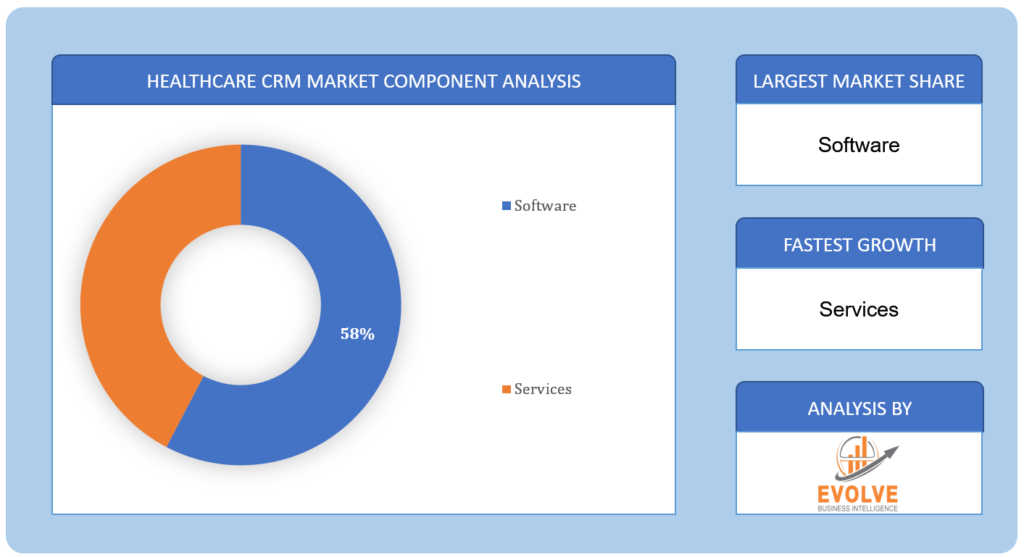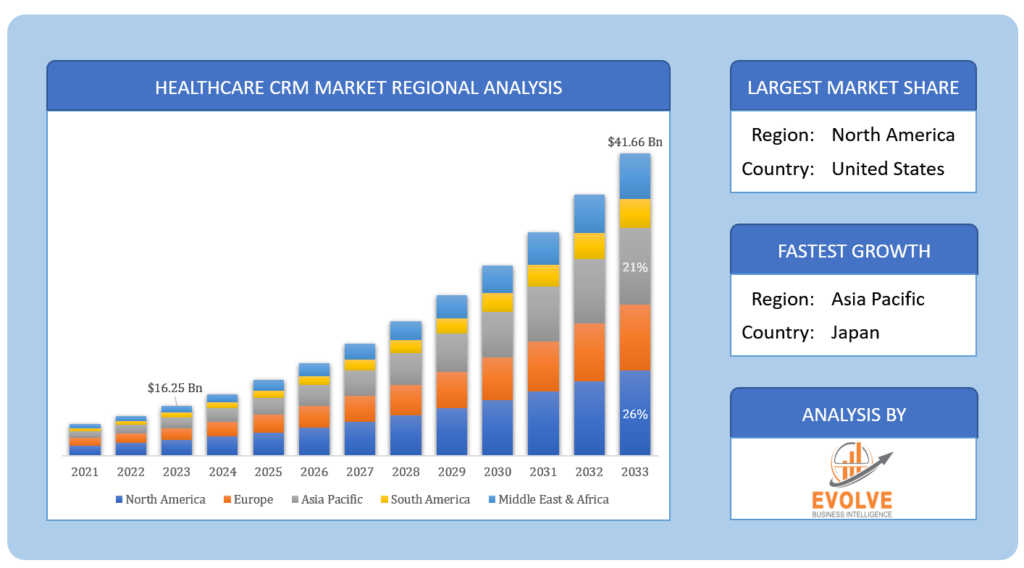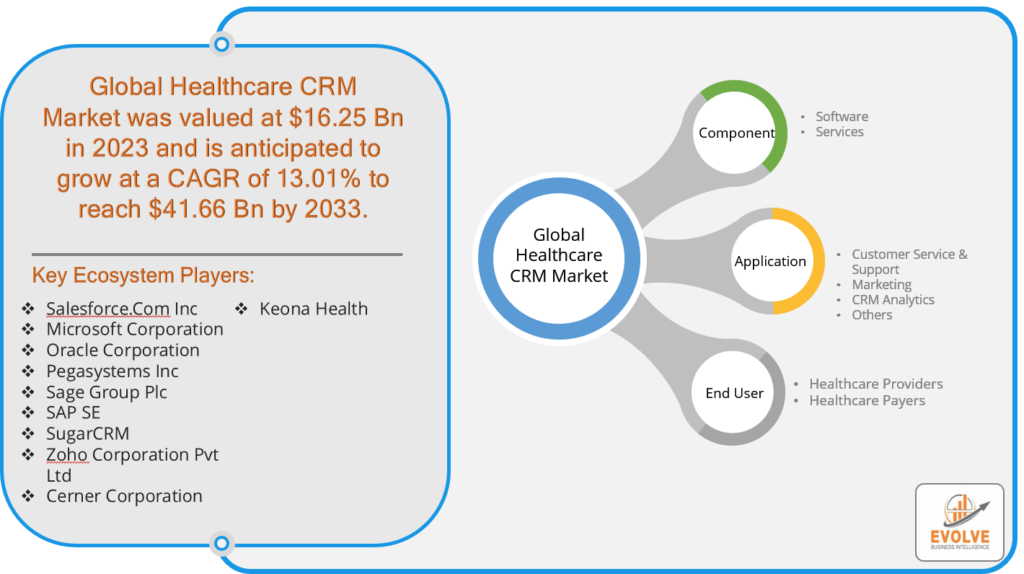Healthcare CRM Market Overview
The Healthcare CRM Market Size is expected to reach USD 41.66 Billion by 2033. The Healthcare CRM industry size accounted for USD 16.25 Billion in 2023 and is expected to expand at a CAGR of 13.01% from 2023 to 2033. Healthcare Customer Relationship Management (CRM) refers to a specialized software system designed to streamline and enhance interactions between healthcare providers and patients, as well as manage relationships with other stakeholders in the healthcare ecosystem. This technology enables healthcare organizations to effectively collect, organize, and utilize patient information, improving communication and engagement. Healthcare CRM systems typically include features such as appointment scheduling, patient data management, and communication tools, allowing healthcare providers to deliver personalized and coordinated care. By fostering better relationships with patients and optimizing internal processes, Healthcare CRM contributes to improved patient satisfaction, more efficient healthcare delivery, and ultimately, better overall outcomes in the healthcare industry.
Global Healthcare CRM Market Synopsis
The Healthcare CRM market witnessed a moderate impact during the COVID-19 pandemic as healthcare organizations globally faced unprecedented challenges. While the demand for digital health solutions and remote patient engagement tools increased, the overall focus and resources of healthcare providers shifted towards managing the immediate and urgent aspects of the pandemic, such as testing, treatment, and vaccination efforts. Implementation of new Healthcare CRM initiatives faced delays or adjustments as organizations prioritized pandemic-related requirements. However, the crisis underscored the importance of efficient patient communication and engagement, potentially driving increased adoption of Healthcare CRM solutions in the post-pandemic landscape as healthcare providers seek to enhance their overall resilience and responsiveness to evolving healthcare needs.
Global Healthcare CRM Market Dynamics
The major factors that have impacted the growth of Healthcare CRM are as follows:
Drivers:
⮚ Growing Emphasis on Patient-Centric Care
The increasing shift toward patient-centric care models is propelling the Healthcare CRM market. Healthcare providers recognize the need to enhance patient engagement, satisfaction, and overall experience, and CRM solutions offer tools to personalize communication, streamline appointment scheduling, and improve care coordination.
Restraint:
- High Implementation Costs
The Healthcare CRM market faces challenges related to high upfront costs of implementation and integration with existing healthcare IT systems. Many healthcare organizations operate on tight budgets, and the initial investment required for adopting CRM solutions, along with potential complexities in integrating them seamlessly into existing infrastructure, may act as a significant restraint.
Opportunity:
⮚ Rise in Telehealth and Remote Patient Monitoring
The surge in telehealth adoption and the increasing importance of remote patient monitoring present a significant opportunity for the Healthcare CRM market. CRM solutions can play a pivotal role in facilitating seamless virtual interactions, patient data management, and remote engagement, aligning with the evolving trends in healthcare delivery towards more decentralized and digital models.
Healthcare CRM Market Segment Overview
By Component
 Based on the Component, the market is segmented based on Software and Services. The Software segment was anticipated to lead the Healthcare CRM market due to the rising demand for advanced digital solutions, including patient data management, appointment scheduling, and communication tools. The dominance of this segment underscores the industry’s inclination towards software-driven innovations to streamline healthcare processes and improve overall patient care.
Based on the Component, the market is segmented based on Software and Services. The Software segment was anticipated to lead the Healthcare CRM market due to the rising demand for advanced digital solutions, including patient data management, appointment scheduling, and communication tools. The dominance of this segment underscores the industry’s inclination towards software-driven innovations to streamline healthcare processes and improve overall patient care.
By Application
Based on the Application, the market has been divided into Customer Service & Support, Marketing, CRM Analytics, and Others. The Customer Service & Support segment is expected to dominate the Healthcare CRM market, primarily driven by the growing emphasis on enhancing patient experiences, effective communication, and care coordination. This segment’s leadership reflects the increasing recognition of the pivotal role customer service plays in fostering positive patient relationships and overall healthcare outcomes.
By End-user
Based on End-users, the market has been divided into Healthcare Providers, Healthcare Payers. The Healthcare Providers segment is positioned to capture the largest market share in the Healthcare CRM market, fueled by a heightened focus on optimizing patient engagement, care coordination, and communication within healthcare organizations.
Global Healthcare CRM Market Regional Analysis
Based on region, the market has been divided into North America, Europe, Asia-Pacific, the Middle East & Africa, and Latin America. The area of North America is anticipated to dominate the market for the usage of Healthcare CRM, followed by those in Asia-Pacific and Europe.
 Healthcare CRM North America Market
Healthcare CRM North America Market
North America asserts dominance in the Healthcare CRM market, propelled by a combination of advanced healthcare infrastructure, widespread adoption of digital technologies, and a strong focus on patient-centric care. The region’s robust healthcare ecosystem, including well-established healthcare providers, pharmaceutical companies, and tech-savvy patients, contributes to the high demand for CRM solutions. Additionally, favorable government initiatives promoting healthcare digitization and the presence of key market players drive innovation and adoption in the North American Healthcare CRM market. The emphasis on improving patient outcomes, optimizing operational efficiency, and complying with stringent healthcare regulations further solidifies North America’s leadership position in shaping the trajectory of the Healthcare CRM market.
Healthcare CRM Asia Pacific Market
The Asia-Pacific region has experienced remarkable growth in the Healthcare CRM market, characterized by a burgeoning population, increasing healthcare expenditures, and a rapid shift towards digitalization in healthcare. The region’s expanding middle class, rising awareness of healthcare services, and government initiatives to improve healthcare infrastructure have contributed to the heightened adoption of Healthcare CRM solutions. Additionally, the COVID-19 pandemic has accelerated the adoption of digital health technologies in the Asia-Pacific, further driving the demand for CRM tools to enhance patient engagement, data management, and healthcare delivery. The dynamic healthcare landscape and the growing recognition of the importance of patient-centric care are key factors propelling the robust expansion of the Healthcare CRM market in the Asia-Pacific region.
Competitive Landscape
The competitive landscape includes key players (tier 1, tier 2, and local) having a presence across the globe. Companies such as Salesforce.Com Inc., Microsoft Corporation, Oracle Corporation, Pegasystems Inc., and Sage Group Plc are some of the leading players in the global Healthcare CRM Industry. These players have adopted partnership, acquisition, expansion, and new product development, among others as their key strategies.
Key Market Players:
- Com Inc
- Microsoft Corporation
- Oracle Corporation
- Pegasystems Inc
- Sage Group Plc
- SAP SE
- SugarCRM
- Zoho Corporation Pvt Ltd
- Cerner Corporation
- Keona Health
Key development:
In April 2022, Cured unveiled the latest iteration of its healthcare-focused digital marketing and customer relationship management (CRM) platform, enhancing its ability to fulfill its mission of providing comprehensive care solutions.
In March 2022, Epic introduced a customer relationship management system tailored for health systems and is actively working on an application utilizing real-world data to assist physicians in researching optimal care practices for their patients.
Scope of the Report
Global Healthcare CRM Market, by Component
- Software
- Services
Global Healthcare CRM Market, by Application
- Customer Service & Support
- Marketing
- CRM Analytics
- Others
Global Healthcare CRM Market, by End User
- Healthcare Providers
- Healthcare Payers
Global Healthcare CRM Market, by Region
- North America
- US
- Canada
- Mexico
- Europe
- UK
- Germany
- France
- Italy
- Spain
- Benelux
- Nordic
- Rest of Europe
- Asia Pacific
- China
- Japan
- South Korea
- Indonesia
- Austalia
- Malaysia
- India
- Rest of Asia Pacific
- South America
- Brazil
- Argentina
- Rest of South America
- Middle East & Africa
- Saudi Arabia
- UAE
- Egypt
- South Africa
- Rest of Middle East & Africa
| Parameters | Indicators |
|---|---|
| Market Size | 2033: $41.66 Billion |
| CAGR | 13.01% CAGR (2023-2033) |
| Base year | 2022 |
| Forecast Period | 2023-2033 |
| Historical Data | 2021 |
| Report Coverage | Revenue Forecast, Competitive Landscape, Growth Factors, and Trends |
| Key Segmentations | Component, Application, End User |
| Geographies Covered | North America, Europe, Asia-Pacific, Latin America, Middle East, Africa |
| Key Vendors | Salesforce.Com Inc, Microsoft Corporation, Oracle Corporation, Pegasystems Inc, Sage Group Plc, SAP SE, SugarCRM, Zoho Corporation Pvt Ltd, Cerner Corporation, Keona Health |
| Key Market Opportunities | • Rise in Telehealth and Remote Patient Monitoring |
| Key Market Drivers | • Growing Emphasis on Patient-Centric Care |
REPORT CONTENT BRIEF:
- High-level analysis of the current and future Healthcare CRM Industry trends and opportunities
- Detailed analysis of current market drivers, restraining factors, and opportunities analysis in the future
- Historical market size for the year 2021, and forecast from 2023 to 2033
- Healthcare CRM market share analysis for each segment
- Competitor analysis with a comprehensive insight into its product segment, financial strength, and strategies adopted.
- Identifies key strategies adopted by the key players including new product development, mergers and acquisitions, joint ventures, collaborations, and partnerships.
- To identify and understand the various factors involved in the global Healthcare CRM market affected by the pandemic
- To provide year-on-year growth from 2022 to 2033
- To provide short-term, long-term, and overall CAGR comparison from 2022 to 2033.
- Provide Total Addressable Market (TAM) for the Global Healthcare CRM Market.





